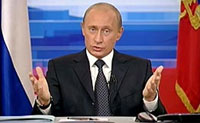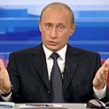
PUTIN PRAISES STABILITY AND PROMISES PROSPERITY
Publication: Eurasia Daily Monitor Volume: 2 Issue: 180
By:

Yesterday, September 27, Russian President Vladimir Putin spent nearly three hours answering questions from Russians who had gathered in specially organized studios across the country. The questions had been carefully selected from over a million messages and the answers were shown live on two main TV channels and transmitted on two radio channels. This annual PR exercise is intended to compensate for the president’s reluctance to address the country directly or to hold domestic press conferences. Significantly, there was no such Q & A session in 2004, so the first presenter asked the president to outline the main developments since the last session in December 2003. Putin chose to emphasize the country’s remarkable economic growth, which set the tone for the whole session.
The majority of the 60 answered questions focused on various social problems, from raising prices on gasoline to pension age and homeless children. This broadly reflects the main current concerns among Russians, most of whom, according to opinion polls, do not believe any improvements in their life are on the horizon (Lenta.ru, September 27). Putin used this opportunity to elaborate on the package of “social initiatives” announced earlier this month, but some observers immediately pointed out that issues related to investment climate or administrative barriers for entrepreneurs, not to mention the Yukos affair or the Mikhail Khodorkovsky court case, went unmentioned (Gazeta.ru, September 27).
Surprisingly few questions involved foreign policy and not a single one touched upon the troublesome problem of “color revolutions” in Russia’s neighborhood. Putin confirmed the rather inflexible position on the four southernmost Kuril Islands and expressed readiness to continue the deadlocked negotiations on their status with Japan. He took a remarkably dovish attitude towards Latvia and asked not to “demonize” this country’s policy towards ethnic Russians, mentioning the “very good talk” he had with Latvian President Vaira Vike-Freiberga at the recent UN summit in New York. The Latvian Foreign Ministry still maintains that the Russian initiative to organize one of the special studios in Riga was not very appropriate (Newsru.com, September 27). One peculiar remark by Putin described a new strategic missile that would be “invulnerable for the missile defense that is developed in some of our partner states” (Polit.ru, September 27).
Even more remarkable was the complete silence on terrorism, about which Putin had emotionally elaborated from the UN podium. He answered several questions from the studio in Grozny, the capital of Chechnya, and admitted that, regarding the widespread kidnappings, local law-enforcement agencies were as much a part of the problem as of the solution. But he concentrated on reconstruction, emphasizing compensation for lost property, and on reducing the scale of unemployment (Vremya novostei, September 28). It looked as if the Beslan school crisis had never happened nor did he repeat last year’s call upon the country to mobilize all efforts for the war against terrorists and their unnamed foreign sponsors.
This omission exemplifies the shift in official discourse back to portraying stability as the main feature and the unique achievement of Putin’s presidency. The recently discussed threats to the very existence of the state are gone, and now Putin asserts that people can plan their lives because the country enjoys “absolute stability.” He oozes confidence that there is enough money to solve all the accumulated problems in health care and reassures pensioners that their worries would be duly addressed. The foundation for this newly achieved prosperity was revealed when Putin casually confirmed that the reserves of oil and gas were “more than we think” and there was enough even for the “next generations.”
Through the whole recovery period after the financial meltdown of August 1998, the Russian leadership was aware of the possibility of a sudden drop in world oil prices – but now such catastrophic scenarios apparently have been shelved. Putin seems to have concluded that the ever-growing inflow of petro-rubles would continue at least until the end of his second presidential term. He confirmed yet again his decision to step down in 2008 – and that eliminates for him any need to experiment with reforms and makes it possible simply to pour money over the most demanding problems.
These expectations concerning oil prices may even be correct but that, unfortunately, does not mean that Putin should relax. He is setting himself up for a fall due to escalating popular expectations. At some point Russians will inevitably grow impatient to cash in their share of the “oil dividend.” The macroeconomic statistics that Putin is so eager to recite are never convincing for the average recipient of promised rewards, and many experts question them (Ekho Moskvy, September 27). Rising inflation, however, is very convincing, and economists know how to stem rising inflation in times of low demand for investment capital and growing disposable income.
By choosing the easy way to redistribute the oil dividends, Putin opened new opportunities for rampant corruption in the state apparatus, and he was in fact unable to answer the question about possible embezzelment of the funds for his social initiatives. Inviting everyone to enjoy the party, he hopes to leave the cleanup to a yet-unknown successor, but the demobilized country would be inevitably caught unprepared by a major crisis. The risks are too many, and it is impossible to talk them away.




